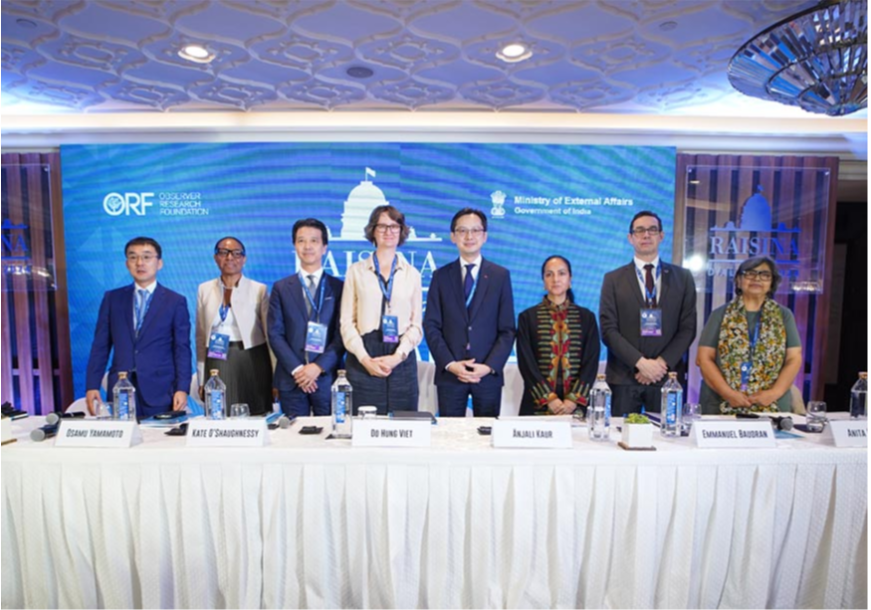-
CENTRES
Progammes & Centres
Location

Amidst escalating geopolitical dynamics in the Indo-Pacific, there is a pressing imperative to synchronise efforts for a policy agenda to tackle the myriad challenges faced by the region. Beyond the traditional security lens, the Indo-Pacific represents a pivotal arena for advancing climate action and sustainable development objectives. The region grapples with profound challenges related to climate adaptation and susceptibility to economic shocks. Escalating food and fuel inflation exacerbates these issues, straining livelihoods and hampering the government's ability to fund developmental initiatives.
In this context, the Sustainable Finance in the Indo-Pacific (SUFIP) Development Network (DN) convened a panel discussion titled 'Desecuritising Development: Resilience in the Indo-Pacific', on the sidelines of the Raisina Dialogue 2024. It aimed to redirect focus away from solely security concerns towards fostering comprehensive resilience and sustainable development strategies in the Indo-Pacific region. The panel consisted of Änjali Kaur, Deputy Assistant Administrator, Bureau for Asia—United States Agency for International Development (USAID); Dulciana Somare-Brash, Development Specialist, DevCom Pacific (PNG) Ltd, Papua New Guinea; Emmanuel Baudran, Global Head of Infrastructure, Agence Française de Développement (AFD); France, Osamu Yamamoto, Chief Executive Officer, Unison Capital Management, Japan; Kate O’Shaughnessy, Research Director, Perth USAsia Centre, Australia. The discussion was moderated by Anita Prakash, Director for Policy Relations, Economic Research Institute for ASEAN and East Asia.
Under the SUFIP Network activities, the report titled ‘Regional Integration in the Indo-Pacific: Connectivity, Cooperation and New Supply-Chain Linkages’ was launched by Tetsuya Watanabe, President of the Economic Research Institute for ASEAN and East Asia, Jakarta, who emphasised the necessity of resilient supply chains amidst geopolitical risks in the region. He highlighted India and ASEAN's emergence as economic powerhouses and their commitment to reliable supply chains through initiatives like “Make in India.” Further, he underlined the pivotal roles of connectivity, digitalisation, an effective data governance in fostering growth and employment, alongside fostering the inclusive mandate of the Indo-Pacific.
Scene setter Do Hung Viet, Deputy Foreign Minister, Vietnam, began the discussion by addressing the need to shift focus from geopolitical competition to addressing pressing challenges like climate change, epidemics, and economic disparities in the Indo-Pacific. He went on to highlight the importance of multilateral cooperation and dialogue in addressing regional challenges, promoting peace, and prosperity, envisioning sustainable growth for all nations. He invited collaborations to champion this new narrative and announced the upcoming Asian Future Forum, aimed at fostering innovative ideas for the region's prosperous and inclusive future.
Änjali Kaur highlighted the United States’ strategic approach towards the Indo-Pacific, emphasising the intersection of security and development within the region. She outlined USAID's efforts with examples to strengthen democratic institutions, foster sustainable economic growth, and improve resilience to health and climate threats. Further, she underscored the need for continued efforts to pivot towards areas where progress is lacking and highlighted a free and open Indo-Pacific that would ensure greater connectivity with sustainable inclusive growth for all.
Dulciana Somare-Brash highlighted the unique set of issues faced by Papua New Guinea, such as a diverse population, and significant natural resource base facing rapid population growth. She stated that the main challenge is to provide basic services to this growing population amidst issues of immigration, high costs of living, and political instability. Somare-Brash went on to highlight the impact of climate on indigenous communities, and the disconnect between urban development and rural areas that intensified the issues. She called for attention to challenges of land rights, indigenous displacement, and the need for respectful frameworks to address development problems effectively.
Emmanuel Baudran emphasised on the necessity of reconciling economic, social, and environmental concerns in the Indo-Pacific, given its significant population, greenhouse gas emissions, and biodiversity. He stressed upon the importance of sustainable infrastructure and called for strengthened public policies and increased investment, particularly through public development banks, to address the region's developmental and climate challenges effectively.
Adding to this, Osamu Yamamoto underscored the significant gap between the private sector's potential to address pressing sustainability and the reluctance of major asset owners, like Japan's Government Pension Investment Fund (GPIF), to invest in the region due to concerns about risk-adjusted returns. He underscored the role of multilateral development banks (MDBs) in bridging this gap by converting social impact into measurable returns and proposed inviting more asset owners to forums like Raisina Dialogue to facilitate conversations and collaboration.
Kate O’Shaughnessy stressed the critical importance of considering islands and oceans when discussing resilience in the Indo-Pacific. She shared examples illustrating the vulnerability of island states, such as Seychelles' struggle to procure COVID-19 vaccines due to its heavy reliance on tourism and stated the significance of frameworks like the Multi-Dimensional Vulnerability Index to address such complexities. Additionally, she underscored the power of small island states by citing the success of the Nauru Agreement in increasing Pacific Island nations' profits from tuna fishing, enabling them to invest in health, education, and marine conservation.
This event report is written by Sharon Sarah Thawaney, Executive Assistant to the Director (Kolkata), Observer Research Foundation
The views expressed above belong to the author(s). ORF research and analyses now available on Telegram! Click here to access our curated content — blogs, longforms and interviews.